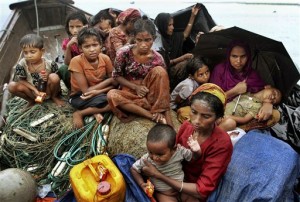
In this June 13, 2012, photo, Rohingya Muslims who fled Myanmar to Bangladesh to escape religious violence, sit in a boat after being intercepted crossing the Naf River by Bangladeshi border authorities in Taknaf, Bangladesh. AP FILE PHOTO
UNITED NATIONS—The United Nations General Assembly approved a resolution Monday urging Myanmar to provide “full citizenship” to its Rohingya Muslim minority and to allow them to move freely throughout the country.
The 1.3 million Rohingyas are denied citizenship under national law and are effectively stateless and have almost no rights. Myanmar authorities want to officially categorize them as “Bengalis,” implying they are illegal migrants from neighboring Bangladesh.
After Myanmar started a transition from dictatorship to democracy in 2011, newfound freedom of expression fanned the flames of hatred against the Rohingyas by the Buddhist majority. Violence by Buddhist mobs left up to 280 people dead—most of them members of the religious minority—and chased another 140,000 from their homes. The Rohingyas now live under apartheid-like conditions in camps or in restricted villages in Rakhine state.
The resolution, adopted by consensus, stressed the assembly’s “serious concern” about the government’s treatment of the Rohingyas, sending a strong message from the 193-member world body that the international community is united in wanting change in Myanmar’s treatment of its minorities.
The General Assembly urged the government to allow the Muslim minority to call itself Rohingya.
It urged Myanmar to ensure that the Rohingyas have equal access to services such as health and education, and to address the root causes of violence and discrimination against them. It also called on the government to take measures to ensure that the Rohingyas can safely return to their communities, to conduct independent investigations into rights abuses, “and to promote peaceful coexistence.”
While the assembly welcomed continuing positive developments in Myanmar toward political and economic reform, democratization, national reconciliation and promotion of human rights, it urged the government “to step up its efforts to end remaining human rights violations and abuses, including arbitrary arrest and detention, forced displacement, rape and other forms of sexual violence.”
The European Union-drafted, non-binding resolution also urged the Myanmar government to accelerate efforts to address discrimination, “violence, hate speech, displacement and economic deprivation affecting various ethnic and religious minorities, and attacks against Muslims and other religious minorities.”
The resolution also addressed international concerns over next year’s presidential election, saying Myanmar should ensure that it is “credible, inclusive and transparent,” and allow “all candidates to fairly contest” the vote.
There has been uncertainty over whether opposition leader Aung San Suu Kyi could hold the presidency. A clause in the constitution bars anyone whose spouse or children are loyal to foreign countries from becoming president or vice president. Suu Kyi’s two sons are British citizens, as was her late husband.
RELATED STORIES
8,000 more Rohingya flee Myanmar—expert
Death toll tops 100 in Myanmar ethnic strife